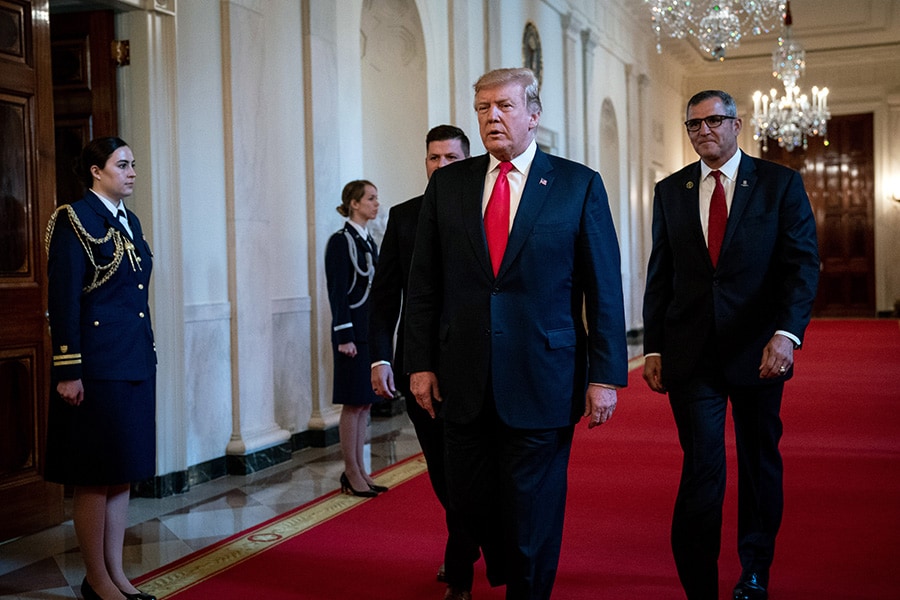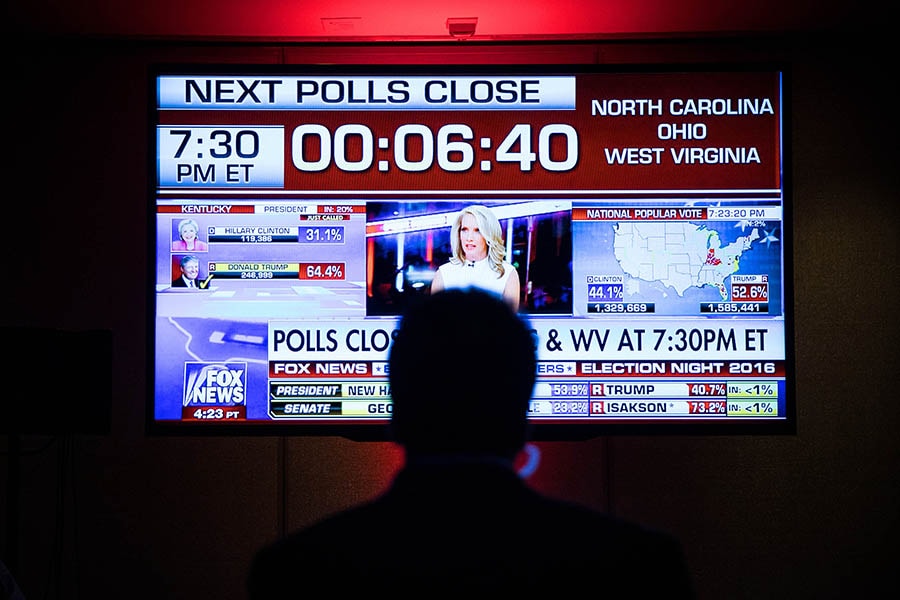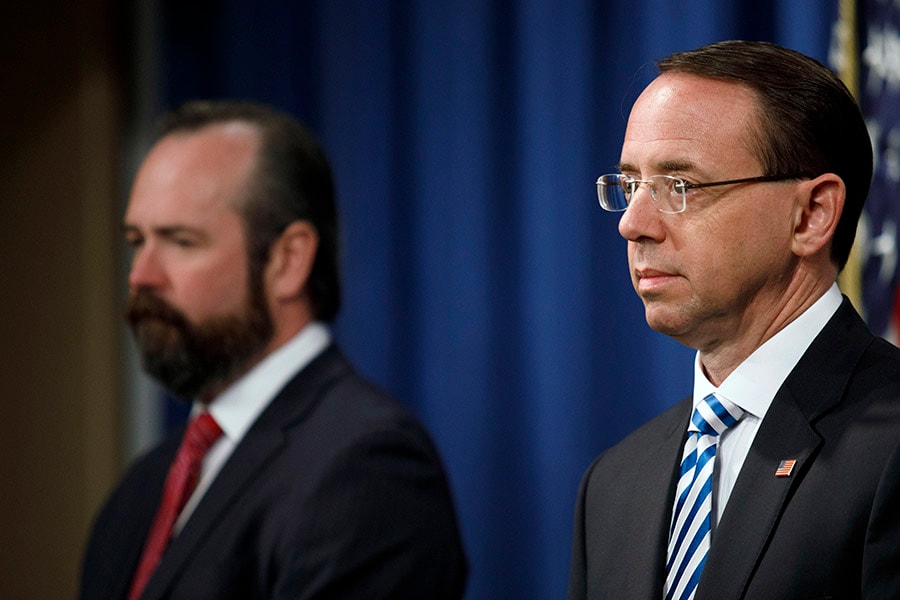When he came back, he gave Trump bad news: Robert Mueller had just been appointed as a special counsel to take over the investigation into Russia’s interference in the 2016 presidential election and any actions by the president to impede it.
Trump slumped in his chair. “Oh, my God,” he said. “This is terrible. This is the end of my presidency.”
It has not been the end of his presidency, but it has come to consume it. Although the resulting two-year investigation ended without charges against Trump, Mueller’s report painted a damning portrait of a White House dominated by a president desperate to thwart the inquiry only to be restrained by aides equally desperate to thwart his orders.
At one point, Reince Priebus, then the White House chief of staff, said the president’s attacks on his own attorney general meant that he had “DOJ by the throat.” At another, the White House counsel, Donald F. McGahn II, complained to Priebus that the president was trying to get him to “do crazy shit.” Trump was equally unhappy with McGahn, calling him a “lying bastard.”
‘We’ll Take Care of You’
From its first days, Trump’s presidency struggled to contain the threat stemming from Russia’s interference in the 2016 election and suspicions about his team’s contacts with Moscow.
Just weeks after taking office, Trump pushed out his national security adviser, Michael T. Flynn, who lied to the FBI about his conversations with Russia’s ambassador.
But Trump hugged Flynn, telling him: “We’ll give you a good recommendation. You’re a good guy. We’ll take care of you.”
Trump and his son-in-law, Jared Kushner, mistakenly assumed that getting rid of Flynn would derail the investigation then being led by James Comey, the FBI director. During lunch with Chris Christie, then the governor of New Jersey, Flynn called, and Kushner spoke with him.
“The president cares about you,” Kushner told Flynn. “I’ll get the president to send out a positive tweet about you later.”
Trump was worried about Comey, too. During the lunch, he asked Christie to call Comey, a friend. “Tell him he’s part of the team,” Trump instructed.
Christie thought the president’s request was “nonsensical” and never followed through.
Other advisers feared Trump was not telling the truth to the public. After a news conference at which Trump denied any business dealings in Russia, Michael Cohen, then the president’s personal lawyer who had been trying to arrange a Trump Tower in Moscow, expressed concern.
Trump said that the project had not yet been finalized. “Why mention it if it is not a deal?” he said.
‘You Left Me on an Island’
With the investigation bearing down on him, Trump wanted to make sure Sessions remained in charge at the Justice Department, and he asked McGahn to tell the attorney general not to recuse himself because of his work on the Trump campaign. McGahn tried to head off a recusal by calling the attorney general three times, but Sessions announced his recusal that afternoon.![g_114969_bg_muellerreportrussia2_280x210.jpg g_114969_bg_muellerreportrussia2_280x210.jpg]() FILE -- Supporters watched returns come in at Donald Trump’s election night rally in Manhattan, Nov. 8, 2016. The Mueller report details how more than two dozen Russians reached out to members or associates of the Trump campaign, an effort that involved increasingly prominent emissaries as the campaign evolved
FILE -- Supporters watched returns come in at Donald Trump’s election night rally in Manhattan, Nov. 8, 2016. The Mueller report details how more than two dozen Russians reached out to members or associates of the Trump campaign, an effort that involved increasingly prominent emissaries as the campaign evolved
Image: Damon Winter/The New York TimesTrump was furious. Summoning McGahn to the Oval Office the next day, he said, “I don’t have a lawyer,” and added that he wished Roy Cohn, the famed bare-knuckled attorney who once worked for him in New York, was still his lawyer. Trump said that Robert F. Kennedy protected John F. Kennedy, and Eric H. Holder Jr. protected Barack Obama.
“You’re telling me that Bobby and Jack didn’t talk about investigations?” he demanded. “Or Obama didn’t tell Eric Holder who to investigate?”
Trump screamed at McGahn about how weak Sessions was, and Stephen Bannon, then the president’s chief strategist, thought he was as mad as he had ever seen him.
Trump increasingly focused his ire on Comey, who during testimony on Capitol Hill on May 3, 2017, refused to answer questions about whether the president himself was under investigation.
Angry, Trump wheeled on Sessions. “This is terrible, Jeff,” he said. “It’s all because you recused.” He added: “You left me on an island. I can’t do anything.”
Sessions said he had no choice, but said that a new start at the FBI would be appropriate and that the president should consider replacing Comey.
Trump was fixated on the FBI director. Bannon recalled that he brought up Comey at least eight times May 3 and May 4. “He told me three times I’m not under investigation,” the president said. “He’s a showboater. He’s a grandstander. I don’t know any Russians. There was no collusion.”
Bannon told Trump that he could not fire Comey because “that ship has sailed” and that it would not stop the investigation.
‘The Beginning of the End?’
Trump ignored the advice and fired Comey on May 9, justifying it on criticism of his investigation into Hillary Clinton’s email the year before. Overruling objections by McGahn and Priebus, Trump insisted that the letter firing the FBI director state that Comey told him three times that the president was not under investigation.
Aides were alarmed. “Is this the beginning of the end?” Annie Donaldson, McGahn’s chief of staff, wrote in her notes.
Sarah Huckabee Sanders, then the president’s deputy press secretary, told reporters that the White House had talked to “countless members of the FBI” who supported the decision to fire the director — but she later admitted to investigators that it was not true. Her comment, she said, was “a slip of the tongue” made “in the heat of the moment” and not founded on anything.
Comey’s dismissal led the deputy attorney general, Rod J. Rosenstein, to appoint Mueller, a former FBI director, to take over the investigation. Fearing it would mean the end of his presidency, Trump lashed out again at Sessions.
Trump demanded that his attorney general resign. Sessions said he would, and he returned to the Oval Office the next day with a resignation letter he handed to Trump.
The president put the letter in his pocket and repeatedly asked Sessions whether he wanted to continue serving as attorney general. When Sessions finally said he did, the president said he wanted him to stay. The two shook hands, but Trump kept the letter.
When they learned about the letter, Priebus and Bannon worried that if he kept it, Trump could use it to improperly influence Sessions it would, said Priebus, serve as a “shock collar” keeping the attorney general on a leash.
The next day, May 19, Trump left the White House for the Middle East. On Air Force One flying from Saudi Arabia to Israel three days later, the president took the letter from his pocket and showed it off to aides. Later on the trip, when Priebus asked Trump for the letter, the president claimed he did not have it and it was actually back at the White House.
Three days after the president returned to Washington, he finally returned the letter to Sessions with a note: “Not accepted.”
But he did not give up trying to regain control of the investigation, calling Sessions at home to ask if he would “unrecuse” himself and direct the Justice Department to prosecute Clinton. Sessions refused.
‘Mueller Has to Go’
If the attorney general would not rein in the special counsel, Trump resolved to find someone who would. On June 17, Trump called McGahn from Camp David and told him to have Rosenstein fire Mueller because of conflicts of interest.
During a 23-minute conversation, Trump said something along the lines of: “You got to do this. You got to call Rod.” McGahn, who along with other advisers believed that the supposed conflicts were “silly” and “not real,” was perturbed by the call.
The president then called again. “Mueller has to go,” he told McGahn. “Call me back when you do it.”
McGahn decided he would resign, determined not to repeat the experience of Robert H. Bork, who complied with President Richard Nixon’s order to fire the Watergate prosecutor during the Saturday Night Massacre before going on to serve as an appeals court judge.
McGahn, saying that he wanted to be more like Judge Bork and not “Saturday Night Massacre Bork,” drove to the office to pack his possessions and submit his resignation. When McGahn told Priebus and Bannon, they urged him not to resign, and he backed off.
Undeterred, Trump summoned his former campaign manager, Corey Lewandowski, to the White House two days later and dictated a message for him to deliver to Sessions that would have effectively limited the scope of the investigation to Russian interference in the 2016 election.
While the meeting with Lewandowski was never held, Sessions understood his tenuous position and carried a letter of resignation in his pocket every time he visited the White House.
‘Boss Man Worried’
In late June, presidential advisers and lawyers learned about a Trump Tower meeting with Russians during the campaign hosted by Donald Trump Jr., along with Kushner and Paul Manafort, the campaign chairman. But the president said he did not want to hear about it.![g_114967_bg_muellerreport8_280x210.jpg g_114967_bg_muellerreport8_280x210.jpg]() From left, Acting Principal Associate Deputy Attorney General Edward O’Callaghan Edward O’Callaghan and Deputy Attorney General Rod Rosenstein listen as Attorney General William Barr speaks to reporters at the Justice Department about the report by the special counsel, Robert Mueller, on Thursday morning, April 18, 2019. Barr offered a strong defense of President Donald Trump in advance of releasing the report, saying that investigators “found no collusion” with Russia and taking it upon himself to clear the president of obstruction of justiceImage: Tom Brenner/The New York Times
From left, Acting Principal Associate Deputy Attorney General Edward O’Callaghan Edward O’Callaghan and Deputy Attorney General Rod Rosenstein listen as Attorney General William Barr speaks to reporters at the Justice Department about the report by the special counsel, Robert Mueller, on Thursday morning, April 18, 2019. Barr offered a strong defense of President Donald Trump in advance of releasing the report, saying that investigators “found no collusion” with Russia and taking it upon himself to clear the president of obstruction of justiceImage: Tom Brenner/The New York Times
A few days later, at the office of Kushner’s lawyer, Hope Hicks, the president’s communications adviser, saw emails about setting up the meeting and offering “dirt” on Clinton on behalf of the Russian government. In a meeting, Kushner played down the encounter with the Russians, telling the president it was about adoption.Hicks suggested getting ahead of the story by having Donald Trump Jr. release the emails as part of an interview with “softball questions.” She warned that the emails were “really bad” and the story would be “massive” when it broke, but the president again said he did not want to hear about it.
On July 7, while the president was at the G-20 summit in Germany, Hicks learned that The Times was preparing a story about the Trump Tower meeting. Hicks, on the flight home from Germany, recommended disclosing the entire story, but the president rebuffed her, saying a draft statement said too much.
Instead, Trump suggested the statement say that his eldest son had attended a meeting about Russian adoptions.
Hicks then texted Donald Trump Jr. a statement asking if that was all right. The president’s son wanted to insert that they “primarily” discussed Russian adoption because, as he texted to Hicks, they “started with some Hillary thing which was bs and some other nonsense which we shot down fast.”
Hicks responded: “I think that’s right too but boss man worried it invites a lot of questions.” The younger Trump, who urged releasing the emails themselves, finally did once the White House learned that The Times was about to publish them.
‘I’ll Have to Get Rid of Him’
In January 2018, The Times reported about the president’s June 2017 effort to have Mueller fired. A livid Trump pressed McGahn to publicly rebut the story, but he would not because the article accurately reported the president’s desires.
Trump insisted that McGahn deny it. “If he doesn’t write a letter, then maybe I’ll have to get rid of him,” the president said, or something to that effect.
John F. Kelly, who had replaced Priebus as chief of staff, then arranged a meeting between Trump and McGahn.
“I never said to fire Mueller,” Trump said. “I never said ‘fire.’ This story doesn’t look good. You need to correct this. You’re the White House counsel.
“Did I say the word ‘fire’?” he asked.
“What you said is, ‘Call Rod, tell Rod that Mueller has conflicts and can’t be the special counsel,’ ” McGahn replied. He refused the president’s request that he “do a correction.”
Trump then complained about McGahn writing things down. “Why do you take notes? Lawyers don’t take notes. I never had a lawyer who took notes.”
McGahn maintained he took notes because he was a “real lawyer,” and they create a record.
“I’ve had a lot of great lawyers, like Roy Cohn,” Trump said. “He did not take notes.”
But McGahn did. And so did plenty of others.

 President Donald Trump arrives to speak at a Wounded Warrior Project Soldier Ride event in the East Room of the White House on Thursday, April 18, 2019. Attorney General William Barr released on Thursday a redacted version of the report by the special counsel, Robert Mueller, on his inquiry into Russian interference in the 2016 election.
President Donald Trump arrives to speak at a Wounded Warrior Project Soldier Ride event in the East Room of the White House on Thursday, April 18, 2019. Attorney General William Barr released on Thursday a redacted version of the report by the special counsel, Robert Mueller, on his inquiry into Russian interference in the 2016 election. FILE -- Supporters watched returns come in at Donald Trump’s election night rally in Manhattan, Nov. 8, 2016. The Mueller report details how more than two dozen Russians reached out to members or associates of the Trump campaign, an effort that involved increasingly prominent emissaries as the campaign evolved
FILE -- Supporters watched returns come in at Donald Trump’s election night rally in Manhattan, Nov. 8, 2016. The Mueller report details how more than two dozen Russians reached out to members or associates of the Trump campaign, an effort that involved increasingly prominent emissaries as the campaign evolved From left, Acting Principal Associate Deputy Attorney General Edward O’Callaghan Edward O’Callaghan and Deputy Attorney General Rod Rosenstein listen as Attorney General William Barr speaks to reporters at the Justice Department about the report by the special counsel, Robert Mueller, on Thursday morning, April 18, 2019. Barr offered a strong defense of President Donald Trump in advance of releasing the report, saying that investigators “found no collusion” with Russia and taking it upon himself to clear the president of obstruction of justiceImage: Tom Brenner/The New York Times
From left, Acting Principal Associate Deputy Attorney General Edward O’Callaghan Edward O’Callaghan and Deputy Attorney General Rod Rosenstein listen as Attorney General William Barr speaks to reporters at the Justice Department about the report by the special counsel, Robert Mueller, on Thursday morning, April 18, 2019. Barr offered a strong defense of President Donald Trump in advance of releasing the report, saying that investigators “found no collusion” with Russia and taking it upon himself to clear the president of obstruction of justiceImage: Tom Brenner/The New York Times